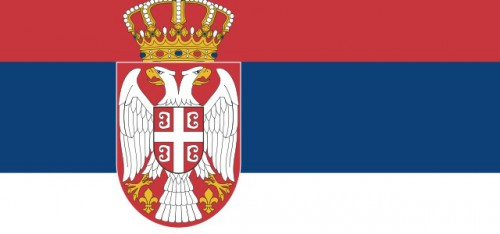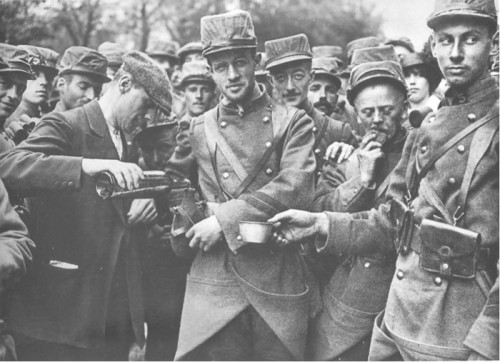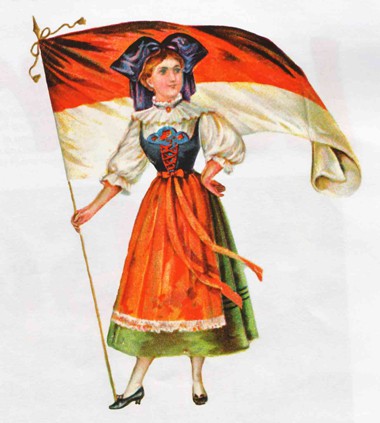 |
Editorial
Autorenporträt Alexander Dugin Der Identitäre Frühling Kriminalstatistik 75 Jahre Marmorklippen Augusterlebnis 1914 Krieg und Literatur Avantgarden im Krieg Bildteil Musikalischer Krieg 24. Juli 1914 – eine Verdichtung Bücher Neue Literatur zum I. Weltkrieg Rezensionen Vermischtes |
I recently received an unexpected gift from American historian and political theorist Barry Alan Shain, The Declaration of Independence in Historical Context, a 600 page collection of documents from the era of the American Revolution, with accompanying commentaries and a long introductory essay, published by Yale University Press. It would be marvelous if Barry’s ambitious scholarship elicited the widespread discussion among journalists and media celebrities that it richly deserves. But I doubt this will happen. The author is not in sync with the authorized political camps, from Dinesh D’Souza to the followers of left-radical historian Howard Zinn, when he warns against such “misconceptions” as the belief that the US was founded as a “propositional nation.” Contrary to this belief: “The Declaration may more accurately be seen as the unintended and undesired culmination of a process of resistance in which the majority of the colonists believed they were defending customary and traditional British constitutional institutions and historical political rights against misguided ministerial and parliamentary innovations.”
Shain demonstrates exhaustively that up until the eve of the Revolution most members of the Continental Congress opposed “parliamentary innovations,” as staunch monarchists. Most of these dignitaries were not comfortable with the natural rights phrases that Thomas Jefferson inserted into the Declaration, a point that such scholars as George Carey and Forrest McDonald have also made. If one could go back in time and tell these delegates they were founding a global democracy based on human rights, and that they were putting the US on a course toward converting the entire planet to something called “liberal democracy,” they would have viewed the speaker as mad.
Although other scholars have offered similar arguments, their views, like those of Shain, cannot possibly prevail against the parameters of debate established by our political-journalistic elites. Certain discussions that would have unfolded in the past have become closed questions. This has happened for two reasons, both of which I try to explain in my book The Strange Death of Marxism.
First, in the cultural and social sphere, the US has moved dramatically toward the left, so much so that the left center in my youth would be well to the right of where “conservatives” have placed themselves. Note that onetime feminist Eleanor Roosevelt wanted to limit women’s access to the workplace, lest their presence there reduce the “single family wage” of their husbands and threaten the unity of the family.
Until the 1960s, women were seen by both of our political parties as primarily wives and mothers; homosexuality was generally viewed as a psychic disorder (by communist even more than capitalist nations); and civil rights for blacks meant the right to sit at an integrated lunch counter. Although those changes that have occurred since then may be viewed by the broad public as “only fair,” they have exacted an enormous price, and part of that price is an intolerance of the way people lived before the cataclysm of the 1960s and 1970s. Please note that an idea like gay marriage would have struck most people as silly and possibly offensive thirty years ago; today it is proclaimed by our media as a fundamental, universal right. The Wall Street Journal rails against Russian leader Vladimir Putin for not allowing self-proclaimed homosexuals to teach in public schools. Through most of my life I could easily imagine most Americans taking similar positions to those of the Russian president, without eliciting the anger of Democratic or Republican newspapers.
Second, the shift of our cultural-political spectrum leftward has brought a narrowing of historical debate, which seems to have resulted in having both sides take what used to be recognizably leftist positions. Certain discussions can barely take place any longer, without the participants being accused by the media, the educational establishment, and the official conservative opposition of racial or gender insensitivity. Is it really possible to take a negative view of Reconstruction, without being attacked as a racist? This fate has befallen even the pro-Union historian William A. Dunning. In his study of the Union army’s occupation of the post-Civil War South, Dunning criticizes the politics and rapacity of the Reconstruction government and of those who were behind it; this hapless historian, who came from an impeccable Abolitionist background, is therefore now condemned as a racist. The book on Reconstruction by Eric Foner, which treats the events in question as a morality play between evil Southern whites and a virtuous Union occupying army, has supplanted other treatments of a now politically settled subject. The fact that Foner, a longtime revolutionary socialist, presents Reconstruction as “America’s unfinished revolution” gives his work a link to contemporary social engineering projects.
But the most disfiguring ideological reconstruction of history has taken place on what is supposedly the conservative side. Here we see the current labeling of good and bad guys read back into the past in order to justify a belligerent foreign policy. Thus the struggles for hegemony between two ancient Greek slave societies, according to Victor Davis Hanson, reveal the outlines of modern confrontations between predictable heroes and equally predictable villains.
These evocations of Manichean struggles, which I notice particularly in Hanson’s newspaper columns, sometimes verge on the ludicrous. They have nothing to do with history as a serious discipline. The first rule for the study of history should be to understand the differences between past and present and then the differences between different things in the past. I am now reading and hearing outbursts of anger in the press about the revival of murderous anti-Semitism in Germany and France. This invective, however well-intentioned, leave the mistaken impression that the violently anti-Jewish demonstrators who are raging through European cities are the left over accessories from the Nazi regime. Only by looking at pictures could one guess that the troublemakers are Muslim immigrants who have been allowed to settle in Western European countries. Although a serious problem is occurring, let’s not pretend it’s more of the evil European past. We are dealing with an unprecedented problem that was caused by an unwise immigration policy.
A discussion that the “conservative” establishment in particular has tried to take off the table concerns responsibility for the Great War that started one hundred years ago. From reading Professor Hanson and Bill Kristol’s Weekly Standard, I would have to assume both counterfactually and counterintuitively, that “autocratic” Germany was responsible for the entire bloodbath, that Winston Churchill played a gallant role in World War One as he did in the struggle against Hitler, in preserving European democracy against the German threat, and that Imperial Germany and possibly the Habsburg Empire were precursors of the Third Reich. These tediously recited opinions are the result of looking in the wrong places for a later disaster, in this case Nazi crimes. Although Imperial Germany was an unevenly developed constitutional monarchy and although the last German Kaiser was far from a model diplomat (who was in European politics in 1914?), Germany in 1914 was a government of law, with the best fed working class and lowest taxes in Europe and a very free press. Germany had no more to do with inciting the First World War, the scope of which none of the belligerents foresaw, than the Entente powers that the Germans fought.
All the major participants behaved with equivalent recklessness, a point that Christopher Clark demonstrates in his magisterial The Sleepwalkers. As someone who has been studying the Great War for forty years, I shall be happy to provide my critics with a mountain of counterevidence to what has become neoconservative holy writ for German sole responsibility for the Great War. This position was supposedly worked out indisputably in Fritz Fischer’s voluminous critical study of Wilhelmine Germany, Griff nach der Weltmacht (1961), a work that seems to have brought equal pleasure to the German anti-national Left, American refugee historians with whom I studied in graduate school, and the future neoconservative masters of the American conservative movement.
Unfortunately for his ill-informed American fans, every major contention in Fischer’s brief against Imperial Germany, which was written by a onetime Nazi zealot, who later made a name for himself as a German antifascist, anti-nationalist historian, has been effectively challenged multiple times. It is even questionable whether Fischer found the evidence for his brief in those East German archives to which he was given access, but which were closed to less radically leftist historians. Much of what Fischer claims to be documenting was glaringly misquoted or given a distorting context. Moreover, those nationalist attitudes Fischer’s books treat as peculiarly German were at least as much present in Germany’s enemies as they were in the German Second Empire. France and Russia has far more extensive military conscription than the Germans and Austrians and were obviously planning for war against the Central Powers in 1914.
Equally noteworthy, the German historian Gunter Spraul in Der Fischer Komplex devotes several hundred pages of minute analysis to investigating how Fischer twisted the statements of German leaders in 1914 and even earlier in order to prove what Fischer never satisfactorily proves: that the German government alone planned a general European war that it unleashed in 1914, for the sake of territorial conquest and economic hegemony. Even more devastating in this regard is the 1100 page work 14/18. Der Weg nachVersailles by Jörg Friedrich, a study that blows out of the water any explicit or implicit defense of the main lines of the Fischer-thesis. Of course the authors of neoconservative screeds against Imperial Germany may be totally oblivious to whatever contradicts the anti-German hang-ups of their patrons. I strongly doubt that these journalists do research in German sources or keep up with relevant secondary works. There is no need for them to do either in order to collect their checks.
There are copious available sources for all the following assertions, which I can easily provide for the curious or skeptical: Although Winston Churchill behaved heroically in facing up to Hitler, the British First Lord of the Admiralty was an anti-German loose wire in 1914 and throughout the decade before the war; it was the Germans and Austrians, never the Allies, who displayed a willingness to end the war with a compromise peace. Not incidentally, there was far more tolerance of antiwar opposition in Germany and Austria than in the “democracies,” particularly after Woodrow Wilson launched our first “crusade for democracy” after having suppressed all opposition to this undertaking.
It is also inaccurate to claim that the British were “driven” into an anti-German and anti-Austrian alliance system because of the naval expansion begun by the Germans in 1898. This build-up never came close to threatening English naval supremacy, and on the eve of the war, Germany had only moved from eleventh place up to fifth as a naval powe r. When Anglophile German Chancellor Theobald von Bethmann-Hollweg (his name is inexcusably misspelled in the English Wikipedia and in its slavish German translation) proposed to scale down the naval build-up and offered other concessions to the British as a way of winning their friendship, he got nowhere in a hurry. As we learn from German dean of diplomatic historians Konrad Canis in Der Weg in den Abgrund 1891-1914 , the British government of Lord Edward Grey ignored the Chancellor’s overtures and proceeded to tighten the encirclement of Germany with the French and Russians. In the summer of 1914, if the war had not broken out, the British would have signed an agreement with the Russians centered on landing Russian armies, who were to be transported in British ships, on the North German coast. This was not in any way prompted by provocative German action. It was, as Canis painstakingly documents, a step toward the hostile encirclement of Germany that the Grey government had been working to achieve since 1905.
Moreover, a civilian government continued to operate in Germany throughout what we are sometimes misleadingly told was a “military dictatorship,” and it was the collapse of the will of the Kaiser and the military command that caused Germany to sue for peace. The parliamentary parties would in all probability have continued the struggle against the Allies. Ironically the military fobbed off the defeat on the civilian government, when it was the military that caved in. The starvation blockade that Churchill placed around Germany resulted in hundreds of thousands of deaths and led to the unrestricted U-Boat sinking carried out by the Germans in the Atlantic, which was intended to divert the blockading British fleet. This misstep handed Wilson’s never really neutral government the excuse to go to war, a step the Anglophile Republican Party had been calling for since 1914.
This blockade would have been illegal as well as outrageously immoral but the British government, knowing they would use this measure in a war they expected to wage against Germany, refused to sign the Hague Conventions, banning starvation blockades on humanitarian grounds. The Belgians were far from neutral in 1914. Indeed the Belgian king had participated in military conversations with the British and French, calling for an amphibious landing of British troops on the Belgian coast in case of war with Germany. Finally, as Niall Ferguson points out in The Pity of War, England would have been in a much better position in 1919, even if the Central Powers managed to squeeze out a victory, than she was after the devastation of World War One. Nor would the US have chosen badly if it had stayed out. It still would have been the world’s major power in 1919 and might have done even better if it had tried, contrary to what it actually did, to broker an honest peace between the two war-weary sides.
These are just a few of the judgments regarding the supposedly bad side in World War One, which would have been axiomatic truths in National Review, Human Events and among many respectable historians circa 1965. Naturally I have no hope of converting Professor Hanson whose idiosyncratic revulsion for the Germans may even exceed that of his neoconservative sponsors, who continue to loathe the Germans as perpetrators of the Holocaust. As a prime illustration of Hanson’s idée fixe, allow me to cite from a column on NATO that he posted on his home site at NR-Online on August 6: “The war-torn democracies were scared that Germany would quickly rebound to prompt yet another European war for the fourth time in less than a century.” Having shown this puzzling passage to various historians of my acquaintance, none of them could figure out what Hanson’s third German war was. We’ll concede arguendo two German wars, but what the hell is the third one. Perhaps Hanson means the Franco-Prussian war in 1870, but in that conflict it was France that stupidly declared war on Prussia (there was no unified Germany at the time). In the rest of his column Hanson rages against the dangers posed by Putin as a Russian nationalist, although even here it seems that Hanson is continuing his anti-German rant and simply transferring it to the new Kaiser Wilhelm in Moscow.
Well at least, Hanson has not descended to the degree of historical illiteracy about World War One that I’ve encountered in the Weekly Standard, most recently on August 4. There I learned that Wilson should have entered the war against the German autocrats much earlier, a point that we somehow learn, or so author Daniel Halper insists, from the events of the Second World War. I don’t quite grasp the connection, but since I’m neither a neocon nor a certified movement conservative any longer, this is not surprising. Apparently had we not entered the European struggle for democracy, after what Halper tells us was Wilson’s honest efforts to maintain neutrality, an aggressive Germany “would have dominated Europe and then threatened the United States.” Perhaps Wilson and Halper would have done well to notice the British starvation blockade, which drove the German government to desperate measures, and the fact that the Lusitania, which the Germans sank in 1915, was not a harmless pleasure vessel, as Halper suggests. The ship was loaded with contraband, including munitions to the British that would be used against German and Austrian soldiers. The Lusitania was also registered with the British navy as an auxiliary cruiser and was therefore a fair war target for the German submarines. Finally, and not insignificantly, the German government had advertised these facts in American newspapers and urged Americans not to expose themselves to danger by travelling on what was viewed as an armed war ship. Oh yes, I know this refutation is an exercise in futility. Neocons have at their beck and call major media resources and don’t have to respond to aging Old Right critics, whom they marginalized decades ago with the snap of their fingers.
Let me end my comments on Germanophobic obsessions, by recalling an exchange at a conference on international relations that was sponsored by the Alexander Hamilton Institute. At that conference I found myself on a panel with Hanson’s Doppelgänger, an army officer who seemed to have emerged from the pages of the Murdoch press but who had actually worked in intelligence. I agreed with my fellow-participant when he stressed the need for a “realistic” foreign policy,” although he may have meant by that term something different from my understanding of it. In my remarks I noted parenthetically that the origins of some conflicts are “extremely complex” and, because of the anniversary of that catastrophe, I mentioned the Great War as an example. The officer then shot back in my direction: “That’s not true. That was caused by a German military dictatorship.” At that point I thought to myself: “Right! And the Spanish American War was caused by a Latin Catholic autocrat who sank our ship in Havana harbor.”





 del.icio.us
del.icio.us
 Digg
Digg Inevitablemente una reseña como esta tiene un componente personal evidente. Como muchos tintinófilos (sin necesidad de caer en una cierta tintinolatría), me acerqué a los cómics de Hergé (Georges Remi, 1907-1983) en mi más tierna infancia. Lo curioso es que a día de hoy no poseo ni siquiera un ejemplar de los 23 álbumes publicados sobre las aventuras de Tintín (y eso si no contamos el 24º, Tintín y el Arte-Alfa, incompleto): siempre los he leído de prestado o in situ en bibliotecas de barrio o en librerías. No me preguntéis por qué nunca he tenido tal tentación (por eso no me acabo de considerar un tintinólatra); lo cierto es que nunca tuve la necesidad y si acaso he releído los diversos álbumes, sin orden ni concierto, ha sido, lo dicho, en bibliotecas o librerías.
Inevitablemente una reseña como esta tiene un componente personal evidente. Como muchos tintinófilos (sin necesidad de caer en una cierta tintinolatría), me acerqué a los cómics de Hergé (Georges Remi, 1907-1983) en mi más tierna infancia. Lo curioso es que a día de hoy no poseo ni siquiera un ejemplar de los 23 álbumes publicados sobre las aventuras de Tintín (y eso si no contamos el 24º, Tintín y el Arte-Alfa, incompleto): siempre los he leído de prestado o in situ en bibliotecas de barrio o en librerías. No me preguntéis por qué nunca he tenido tal tentación (por eso no me acabo de considerar un tintinólatra); lo cierto es que nunca tuve la necesidad y si acaso he releído los diversos álbumes, sin orden ni concierto, ha sido, lo dicho, en bibliotecas o librerías.

